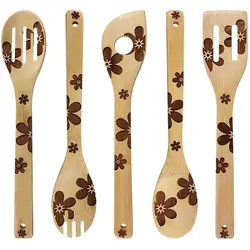Natural Bamboo Cutlery: Eco-Friendly Choice for a Greener Future
Natural bamboo cutlery is indeed an excellent choice for a greener future. Bamboo is a highly sustainable and renewable resource that grows much faster than traditional hardwood trees. Here are some reasons why natural bamboo cutlery is considered eco-friendly:
- Sustainability: Bamboo is one of the fastest-growing plants on Earth. It can grow up to several feet in just a few months and reaches maturity within 3 to 5 years, whereas hardwood trees take decades to mature. Bamboo can be harvested without killing the plant, as it continues to grow from its root system. This makes bamboo an extremely sustainable resource.
- Renewable: Since bamboo grows rapidly and can be harvested without harming the plant, it is considered a renewable resource. This means that bamboo cutlery can be produced without depleting forests or contributing to deforestation, which is a major concern for the environment.
- Biodegradable: Natural bamboo cutlery is biodegradable, meaning it can decompose naturally over time. Unlike plastic cutlery, which takes hundreds of years to break down and often ends up in landfills or oceans, bamboo cutlery will return to the soil without causing long-lasting harm to the environment.
- Low environmental impact: The production of bamboo cutlery has a relatively low environmental impact compared to other materials. Bamboo requires less water and pesticides to grow compared to traditional crops, making it a more environmentally friendly choice. Furthermore, bamboo does not require extensive processing or chemicals to convert it into usable products like other materials do.
- Versatility: Bamboo is a versatile material that can be used for various purposes, including cutlery. It is lightweight, durable, and naturally antimicrobial, making it suitable for everyday use. Bamboo cutlery sets often come with a spoon, fork, and knife, providing an eco-friendly alternative to single-use plastic utensils.
By choosing natural bamboo cutlery, you can help reduce plastic waste, deforestation, and environmental damage. It is a sustainable, renewable, and biodegradable option that aligns with the goal of creating a greener future.


